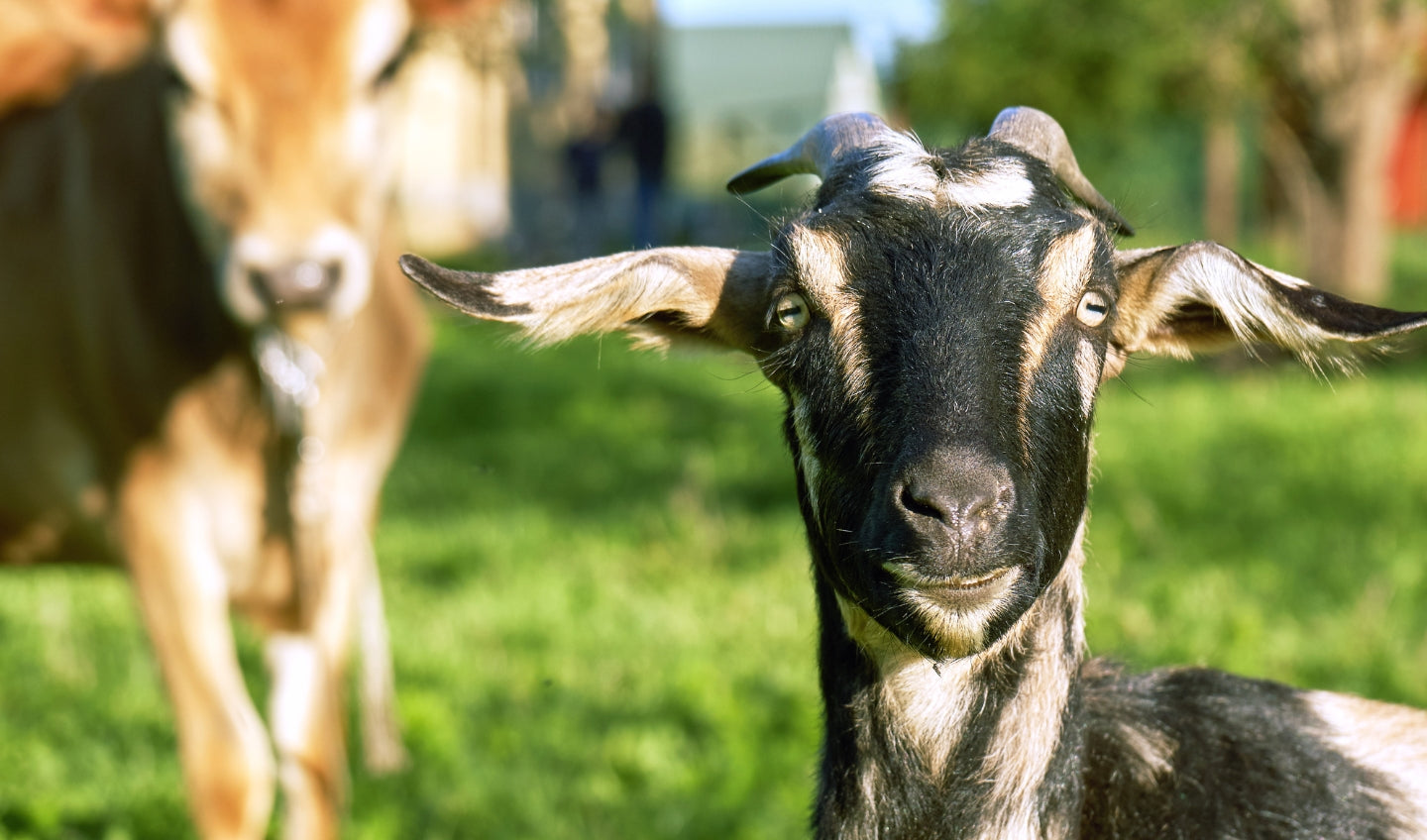Choosing the right type of milk formula for your baby is crucial for their health and development. While breastfeeding is recommended as the best option for infants, there are situations where formula feeding becomes necessary or preferred. In this case, selecting the appropriate milk formula is an essential step in providing your child with optimal nutrition!
Every baby is unique, and their individual needs call for personalized care. That's where the wonders of goat milk formula and cow's milk formula come into play. These remarkable options have been making waves in the world of baby nutrition, offering a variety of possibilities to cater to each baby's distinct dietary needs.
As you embark on this exciting journey, remember that your child's well-being and comfort are at the forefront of every decision you make. Let us help you make an informed decision by highlighting the contrasting features of European cow and goat milk infant formulas.
Cow Milk Formula 🐮: Features and Benefits
Cow milk-based European baby formulas are a popular and widely available choice for parents seeking reliable and nutritious options for their infants.
These formulas are carefully formulated to resemble the composition of human breast milk, providing essential nutrients necessary for healthy growth and development.

Key ingredients and nutritional highlights 🍼
Cow milk-based formulas are designed to offer a balanced blend of proteins, carbohydrates, fats, vitamins, and minerals, meeting the nutritional requirements of growing infants.
Lactose is the primary carbohydrate source, a natural sugar found in cow's milk, and closely resembles the lactose content in human breast milk. Lactose provides energy and aids in the absorption of calcium and other nutrients.
These formulas are enriched with a wide range of vitamins and minerals to support the nutritional needs of infants. These include vitamins A, D, E, and C, iron, calcium, zinc, and others, which play crucial roles in bone development, immune function, and overall health.
European cow milk infant formula is fortified with the essential fatty acid DHA (omega-3), an ingredient required by law. However, most manufacturers also add omega-6 fatty acids (AA, ALA, or ARA). These fats are vital for brain development and visual acuity.
But that's not all; many European cow milk formulas also contain prebiotics and probiotics, which can help improve digestion and strengthen the immune system.
Popular cow milk formula brands ✨
While many baby formula brands specialize in cow's milk products, some of the most notable and widely loved products come from HiPP, Holle and Kendamil.
These brands are known for using clean ingredients, their holistic approach to nutrition and their implementation of environmentally conscious practices.
Goat Milk Formula 🐐: Features and Benefits
Goat milk-based European baby formulas have gained popularity as an alternative to cow milk-based formulas. They are specially formulated to provide essential nutrition for infants who may have difficulty digesting cow's milk or have general tummy troubles.

Key ingredients and nutritional highlights 🍼
Like cow's milk, European goat milk-based formulas are fortified with additional nutrients to meet the nutritional requirements of infants. They typically include vitamins, minerals, and essential fatty acids to support brain development, immune function, and overall growth.
Goat milk boasts a protein profile closely resembling human breast milk, making it a gentle option for your baby's delicate tummy. The unique composition of goat milk, including its easily digestible proteins, can help reduce symptoms such as colic, gas, or constipation in some infants.
Popular goat milk formula brands ✨
As the demand for goat milk formulas continues to surge, numerous brands are stepping up to offer this alternative to traditional cow milk formulas. Among the array of choices, several innovative and highly reputable brands have gained recognition for their goat milk formulas.
Holle, Nanny Care, and Jovie are notable names on the baby formula market, renowned for their commitment to quality and trustworthiness.
These brands have garnered a solid reputation, providing parents with reliable options when opting for goat milk formulas for their little ones.
Comparing Goat Milk Formula vs Cow Milk Formula: Key Differences
Before we get into the differences, it is important to note that every baby formula undergoes careful adjustment in its composition to ensure that it contains all of the essential nutrients necessary for your little one's healthy growth and development.
That means whether your little one takes a goat or milk-based formula, they are bothnutritionally complete infant formulas enriched with everything your little one needs to thrive!

Nutritional composition and differences
Cow's milk naturally contains higher levels of vitamin B12 and folic acid, and goat milk boasts increased amounts of calcium, potassium, and vitamin A.
Manufacturers fortify cow's milk-based and goat milk-based formulas with essential micro-nutrients when these nutrients are not naturally present in sufficient levels in the milk. This ensures that the formulas provide a well-balanced combination of necessary nutrients, giving you peace of mind about your baby's nutritional needs.
These fortified formulas are thoughtfully designed to provide everything your formula-fed baby needs to thrive and flourish in their early stages of life.
Digestibility and protein structure
Cow and goat milk consists of two primary types of milk protein: whey and casein. In cow milk, casein, a larger and more complex protein, makes up approximately 80% of the total protein structure.
Breast milk, however, has a lower ratio of casein to whey. This ratio changes throughout different lactation periods, ranging from around 20:80 to nearly 50:50. To mimic the composition of breast milk and adapt to the stages of a baby's life; infant formula manufacturers adjust the protein ratio according to your little one's age.
Despite this, goat milk has a protein profile closer to human breast milk. It is naturally free of A1 beta-casein, which is found in most cow's milk and can trigger inflammation in the body in some cases. Goat milk is naturally A2 beta-casein, making it more suitable for sensitive tummies.
One of the advantages of goat milk protein is that it forms a light and soft curd in the stomach, allowing for easier digestion. In contrast, cow milk proteins form a heavier and firmer curd. Most babies tolerate cow's milk extremely well, but goat milk formula may be a better option if they are prone to tummy troubles.
Allergenic potential
Goat milk protein tends to be lower in allergens, reducing the likelihood of adverse reactions. However, it's important to note that while goat milk is generally well-tolerated, babies with a cow's milk protein allergy may still experience an allergic reaction to goat's milk due to shared similarities between the two.
For this reason, goat milk is unsuitable for babies with cow's milk protein allergy (CMPA) or lactose intolerance.
Taste and texture
One noticeable distinction between goat and cow milk is that goat milk generally possesses a more robust flavour, which many describe as creamier and slightly sweeter.
While this typically doesn't pose an issue, it's important to note that if you're transitioning from cow milk to goat milk formula and your baby is accustomed to the taste of cow milk, it may take some time for them to adapt to the new flavour.
Factors to Consider When Choosing Between Goat Milk Formula vs Cow Milk Formula
1. Baby's nutritional needs and preferences
When choosing a baby formula, consider your baby's age, nutritional needs, and dietary restrictions or preferences.
For example, some babies do wonderfully on a tried and trusted cow milk infant formula, whereas others require more specialized formulas to manage colic and constipation.
Furthermore, for babies with sensitive tummies, the increased digestibility of goat's milk protein can be a favourable alternative to cow's milk.
2. Special dietary requirements and allergies
Various factors, including employment, travel, and having other children, can influence your decision when choosing a baby formula.
If you lead a busy lifestyle that necessitates feeding your baby outside your home, opting for a Ready-to-Feed formula may be convenient for on-the-go feedings.
Additionally, it's important to consider your budget when selecting a formula for your child, as certain products may offer more cost-effective options than others.
3. Expert recommendations: nutritionists and pediatricians
Before making any changes to your baby's diet, we recommend discussing your options with a trusted healthcare professional.
Popular European Goat and Cow Milk Formula Products
Discover Europe's best cow and goat milk infant formula. These formulas are trusted by parents worldwide for their nourishing ingredients, top quality, and sustainability.
Goat milk formulas

1. Holle Goat Milk Formula
Holle organic goat milk formula is an excellent alternative to cow's milk formula, particularly for babies with cow's milk sensitivity or a more sensitive stomach.
However, it is important to note that goat milk is unsuitable for babies with cow's milk protein allergy (CMPA) or lactose intolerance.
This formula is crafted using A2 goat milk protein, which has smaller fat molecules and lower lactose content, making it easier to digest.
2. Nanny Care Goat Milk Formula
Nannycare offers a gentle goat milk-based formula. It contains gentle A2 milk protein, which produces softer milk curds in the stomach compared to cow's milk, making it easier to digest for babies with sensitive tummies.
Nannycare formulas also contain higher levels of natural oligosaccharides which are important prebiotics that support optimal gut health.
These formulas are free from palm oil, maltodextrin, soy, and GMOs. Moreover, they omit whey powder, eliminating the need for additional processing steps commonly found in whey-based formulas.
3. Jovie Goat Milk Formula
Jovie offers a wholesome goat milk baby formula made from only the best organic ingredients. This formula does not contain unnecessary additives like palm oil or maltodextrin.
It's all about embracing the wholesome goodness of nutrient-rich goat milk, which includes nutrients like fatty acids for brain and visual development, medium-chain triglycerides for improved fat absorption, lutein for eye health, and added prebiotics for a healthy bowel.
Cow milk formulas

1. Holle Organic Infant Formula
Holle's cow milk formulas, stages Pre to 4, are crafted using Demeter quality organic milk, ensuring high quality and purity.
These formulas are free from artificial sweeteners and GMOs. They contain essential nutrients such as vitamins A, D, and E, minerals, and essential fatty acids like DHA and ARA.
2. HiPP Organic Combiotic First Infant Milk
HiPP Bio Combiotic formula is derived from milk sourced from organic farms that follow chemical-free agricultural practices, and it is free from artificial sweeteners and GMOs.
This formula contains valuable components such as probiotics and prebiotics, essential fatty acids (DHA and ARA), and essential minerals and vitamins A, D, and C.
To closely resemble the composition of breast milk, HiPP has incorporated natural probiotic lactic acid cultures obtained from real breast milk into their infant formula.
3. Kendamil Organic First Infant Milk
Kendamil Organic First Infant Milk is thoughtfully formulated to provide a comprehensive nutritional profile that promotes your baby's growth and development. It can be used as a supplementary or alternative option to breast milk from birth to six months.
This formula is created using high-quality full cream milk sourced from happy cows, but what sets Kendamil apart is its inclusion of naturally occurring Human Milk Oligosaccharides (HMOs), which are normally found in breast milk and play a vital role in strengthening your baby's immune system.
Frequently Asked Questions About Goat Milk Formula vs Cow Milk Formula
Get answers to common inquiries about the differences and benefits of goat and cow milk-based formula in this helpful FAQ section!
Can you switch between goat milk and cow milk formulas?
While it is possible to switch formulas, it is best to introduce changes gradually to avoid digestive issues.
If you plan to switch to a different type of formula, such as from cow's milk formula to goat's milk formula, a gradual transition is even more crucial.
Before making any changes to your baby's diet, it is advisable to consult with your pediatrician for appropriate guidance and support.
Are there any specific concerns or considerations when choosing between goat and cow milk formulas?
Both goat and cow milk infant formulas can be healthy and nutritious choices for your baby, provided there are no diagnosed or suspected cow's milk allergies or lactose intolerance.
A formula that works wonderfully for one baby may not be suitable for another, so monitor for symptoms that may indicate a food sensitivity or intolerance, such as post-feeding discomfort (excessive crying, irritability), diarrhea, frequent nausea, vomiting, bloating, or gas.
How do European goat and cow milk formulas compare to non-European options?
Parents worldwide are increasingly opting for European baby formulas, partly because European food standards often transcend American standards regarding quality and control.
European infant formula brands prioritize high-quality ingredients and avoid unwanted additives like sucrose and corn syrup. These formulas are also produced without GMOs or artificial flavors, colors, or preservatives.
What are the main factors that set goat milk and cow milk formulas apart?
The main difference comes down to digestibility, with some babies better tolerating goat's milk formula.
Wrapping Up: Making the Best Choice for Your Baby - Goat Milk Formula vs Cow Milk Formula
The most important factor when choosing between cow's milk and goat's milk formulas is your baby's well-being and comfort. Both cow and goat milk formulas are well-loved by babies and highly regarded by parents.
Popular brands like Holle, Kendamil, Nanny Care, and Jovie are leaders in the European baby formula market, offering innovative and carefully crafted products. So, regardless of the formula you choose, you can be confident that your child's nutritional requirements will be fulfilled.
Feel free to explore our shop to discover the fantastic range of options available from these renowned European formula brands!
Breast milk is the best source of nutrition for babies. Before altering your baby's diet or feeding routine, consult your healthcare provider for personalized recommendations. The information in this article is strictly for informational purposes and is not a substitute for medical advice.





